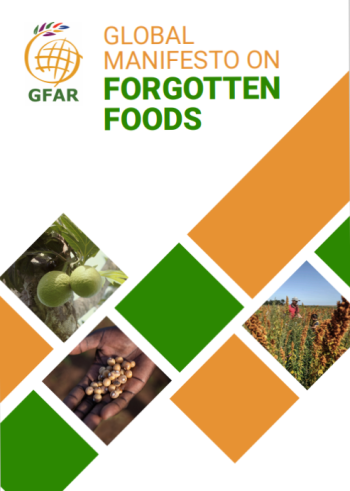This Manifesto on Forgotten Foods is the result of a broad and intensive consultation process carried out in Africa, Asia-Pacific, Europe and the Middle East (see Annex 1 for the roadmap). It was facilitated by GFAR as part of its Collective Actions to Empower Farmers at the Center of Innovation; led by a coalition of Regional Research Organizations and their partners, in particular, AARINENA, APAARI, FARA; and supported by CFF, and the Alliance of Bioversity International and CIAT. In this process, thousands of actors from many countries took part in research activities, data analysis, presentations and discussions, deliberations and debates, and in the drafting of three regional manifestos on forgotten foods (see Annex 2 for the numbers of participants and Annex 3 for the names of organizations involved); eventually resulting in this concise and synthetic document based on consensus. Actors included members of farmer organizations, civil society and community-based organizations, women and youth organizations, research, extension and development organizations, private sector entities, and government agencies. The scale and scope of this initiative are unprecedented and represent a big step forward on the global forgotten foods agenda.
The content of this Manifesto is a landmark by presenting a coherent, multi-faceted but systemic, collective action-oriented proposal that covers research and innovation, and development (policy). The Manifesto aims to serve as a guide for the present and the future of forgotten foods. Its proponents call for a transformation of the agricultural research and innovation system through: change in research methodologies/paradigm; professional change; changes in the governance/ organization of development, research and innovation; changes in institutions; and changes in training/capacity building approaches and curricula.
The Manifesto places smallholder farmers center stage, as producers and custodians of forgotten foods and related knowledge, agents of change and co-producers of (new) knowledge and practices. The Manifesto calls for concrete actions that contribute to achieve several of the Sustainable Development Goals of the United Nations, and to the ‘Right to Food’ and the ‘Right to Health’ embedded in the Universal Declaration of Human Rights. It is also meant to be an invaluable input for the United Nations Food Systems Summit later in 2021.

